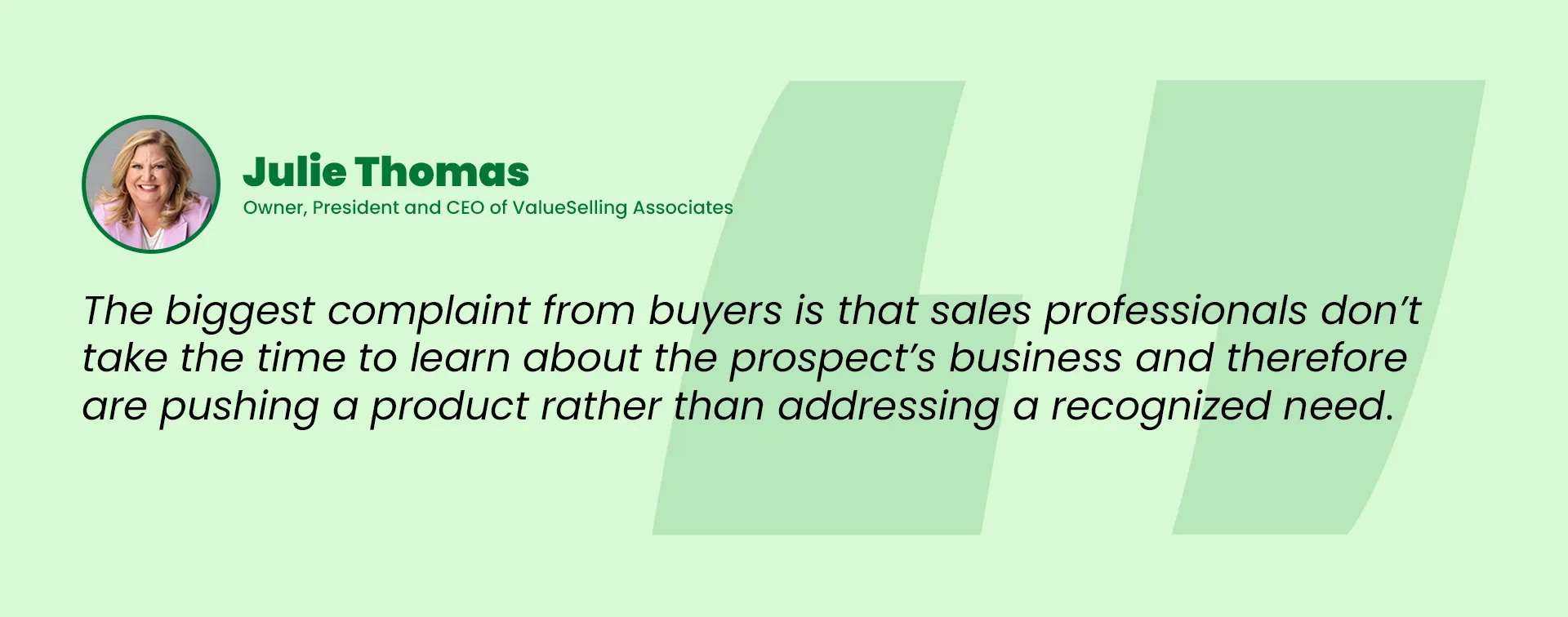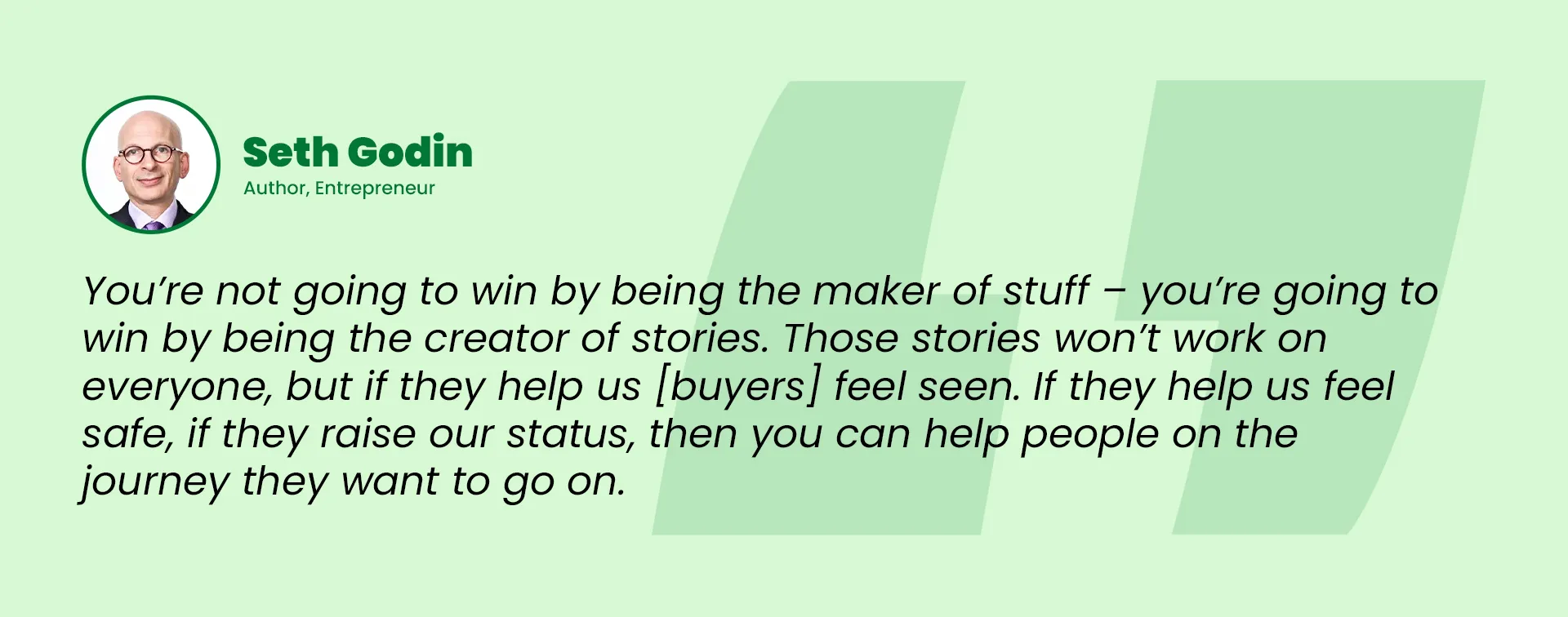If you want to improve your team’s sales skills and performance, you need to develop hard skills, like product knowledge and technical proficiency, as well as soft skills like empathy, persuasion, and adaptability.
In this article, we’ll list the most important salesperson skills and provide tips on developing them. Soft skills, sometimes called common or core skills, are those that are relevant to all professions, like communication and empathy. While all soft skills are valuable to some degree, some are particularly useful to sales representatives looking to hit quotas and generate revenue.
Here are seven soft skills that will help you build strong relationships and close more deals.
1. Empathy
An empathetic sales rep prioritizes their leads’ and prospects’ feelings and goals over their own.
By showing you care about your customers’ needs, you help build trust. That’s powerful when, according to LinkedIn’s State of Sales Report, only 40% of buyers believe salespeople are trustworthy.
As well as building trust, empathy helps reps delve deeper into leads’ problems so they can find the root issue and present the best solution. This, in turn, makes it easier to deliver relevant product and service recommendations, contributing to a personalized buying experience and greater customer satisfaction.
Importantly, by actively listening to concerns, you can pivot based on the conversation and overcome sales objections and rejections.
To develop empathy:
- Focus on how you pay attention. If you’re zoning out or not actively listening, intentionally practice being more engaged
- Be curious. Asking questions and listening intently to the answers is a quick way to develop stronger relationships.

2. Persuasion
Persuasion is a valuable soft skill in sales, but it’s vital to know the difference between this and manipulation.
Rather than relentlessly encouraging prospects to pick certain products or services based on a selfish goal (e.g. hitting a quota or selling a high-ticket item), a persuasive salesperson provides gentle reassurance to nurture prospects toward a confident purchase decision.
For example, this could involve directing the lead to a relevant case study so they can see the tangible benefits of a product in a real-life scenario. If the prospect isn’t convinced, they’d ask more open-ended questions to dig deeper into their needs, and then share alternative solutions that are more relevant, regardless of price or complexity.
Persuasion skills are useful at all stages of the sales cycle. They’ll help you overcome early objections from distracted prospects and wary gatekeepers. They’ll also help you to reassure leads that you understand their needs and can solve their problems.
To develop persuasion skills:
- Put yourself in your prospects’ shoes. Consider what could be stopping them from talking to you or progressing with a deal and how you can help them overcome it.
- Practice asking questions to break deadlocks. Ask if there’s a better time for the prospect to talk or if there’s information you can provide that will reassure them or their manager.

3. Adaptability
Every buyer is unique, so there’s no one-size-fits-all sales technique. What’s more, circumstances change. Whether it’s an entire industry shift, like updated legislation, or one customer revealing new requirements mid-negotiation, you must always be ready to adapt your sales approach.
To be an adaptable salesperson, you should have the product knowledge to handle unexpected questions in sales meetings (perhaps through sales enablement material). You should also have enough understanding of your industry, business, and target audience to reassure leads when something doesn’t go as planned.
To develop adaptability:
- Escape your comfort zone. If you’re great at selling one product or service, make it next month’s target to sell more of a different one so you can get used to a range of customer expectations and questions.
- Shadow a sales engineer or product manager. Sales engineers and product managers have unique technical knowledge, which makes them a goldmine to shadow. Don’t expect to learn everything they know, but do watch them perform technical and product demonstrations to absorb some of their expertise.
4. Organization
While salespeople need to be team players so they can contribute to business-wide goals, many reps work independently and largely unsupervised, which requires different salesperson skills. Our State of Sales Report 2020-2021 found that 41% mostly work from home.
Sales reps have a lot of responsibilities, from managing leads and hosting meetings to reporting, traveling (if you work in the field or outside sales), and training. There’s a lot to juggle outside of closing deals, so organization skills are critical.
An organized salesperson knows which prospects need attention and they take the time to check in and follow up when necessary. A CRM tool makes staying organized easier by helping you know exactly when to follow up with a contact.
Workflow efficiency creates time for sales activities that are sometimes neglected, such as personal development and coaching others.
To develop organizational skills:
- Time and record your regular activities. You’ll begin to understand where your time goes and learn how to use it more effectively.
- Let technology help you. CRM software will give you a big-picture view of your tasks so you can more easily prioritize your responsibilities. Even better, use CRMs to automate workflows and repetitive tasks, like creating follow-up reminders and sending personalized emails when deals move to a new stage.
Note: Customer relationship management (CRM) software will allow you to keep track of interactions with leads, better understand your customers, and identify opportunities to improve sentiment.
5. Resilience
In sales, you can be doing everything right and find that you still can’t close a deal due to forces outside of your control, like the buyer not being able to get approval from their manager. This is why even great reps sometimes don’t meet their quotas.
Rather than dwell, resilient sales managers and reps take steps to mitigate poor performance.
Leaders who create supportive environments allow reps to be honest about their struggles, so they can address them. With their manager’s support, a struggling rep can get back to basics and focus on completing the component tasks of the agreed sales process, rebuilding their confidence with each small success.
Managers can also get a clearer view of their sales team’s processes using a visual CRM pipeline and may spot patterns that are easy to correct.
To develop resilience:
- Recognize the positives of failure. Talk openly about sales struggles, so they become learning opportunities, not something you and your colleagues instinctively bury.
- Take notice of other reps’ struggles. This will help you to accept that sales can be difficult and not everything is in your control.
- Stay optimistic. The best sales reps keep an optimistic attitude, even in the face of difficult times. This is one of the must-have qualities top sales representatives possess. Easier said than done, but even if momentarily discouraged, the best reps don’t give into defeat.
Note: LinkedIn’s online sales training course, Transitioning to Management for Salespeople, includes a lesson on “dealing with network”. It’s most relevant to sales leaders but is a great opportunity for all salespeople to hear an experienced sales consultant Vahagn Ghazaryan discuss resilience.
6. Communication
As a sales rep, you are largely responsible for turning prospects into paying customers.
Effective communication skills will help you understand those customers’ pain points and allow you to solve them by recommending the most suitable products.
Effective communication, cross-departmentally and with team members, is also critical to sales success. It allows you to build the product and customer knowledge you need to reassure leads and sell confidently.
For example, your marketing and customer service teams might help you uncover new pain points or emerging buyer personas, so you know which product features to emphasize in a meeting or presentation.
Communication is a complex field but here are three areas to focus on as a salesperson:
- Listening skills. Active listening helps you better understand your audience’s needs (more on this later).
- Clarity. Speaking with clarity helps you communicate your product’s value effectively.
- Tone. Using the right tone helps with relationship building.
To develop communication skills:
- Vary your communication channels. If you’re more comfortable talking to prospects on the phone, challenge yourself to send more emails so you can practice your written communication skills.
- Shadow top-performing reps. Learn from their interactions with prospects how to use tone and language to make buyers feel comfortable and confident.

7. Storytelling
Great storytelling works in sales as it does in marketing: by appealing to buyers’ emotional decision-making process.
Harvard Business School Professor Gerald Zaltman reported from his research that 95% of consumers’ thinking occurs in the subconscious mind. So, even when buyers believe they’re using logic to make decisions, it’s emotion in control.
Salespeople can use great stories to trigger emotional responses that make prospects believe more in products and, therefore, more likely to buy. In marketing, you might see subtle storytelling in copy or visual content, whereas in sales, it’s used more in conversations, pitches, and product demos.
For example, a B2B sales pitch story could use the following structure:
- Status quo. “This is how your business is operating right now.”
- Conflict. “All of those manual admin tasks are pulling your team away from your customers and hindering their experience of your business.”
- Resolution. “Our automation software will take care of those menial tasks, so your team can focus their attention on personalized customer service.”
- Outcome. “With more attention from your team, customer sentiment improves, and repeat business increases.”
To develop storytelling skills:
- Read, read, read. Look for the narrative structure in every form of media you consume, from news articles to fiction, to understand how your audience feels at certain stages of your presentation and effectively tap into their emotions.
- Take inspiration from marketers. Look for the stories they tell in their content (you can take inspiration from your business’s marketers or the marketing efforts of major brands).

Final thoughts
It takes a lot of work to be a great salesperson.
Possessing the right skills and traits will make you a competent rep, but you must continually work on them to become an elite sales professional.
Knowing how to improve sales skills is key. Keep honing your craft through online sales courses, in-person coaching, and real-life experience, and you’ll soon be exceeding your quota consistently.
Driving business growth
Full access. No credit card needed.




